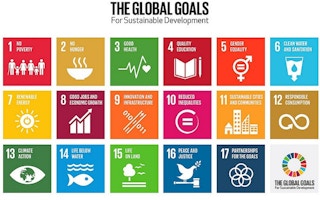Businesses will be the single most important driver for the delivery of the United Nations’ Sustainable Development Goals (SDGs), say almost 49 per cent of CEOs in a recent report by Accenture Strategy and United Nations Global Compact.
UN Global Compact executive director Lise Kingo said: “The adoption of the SDGs gives companies a clear and universal roadmap to make global goals (relevant to) local business.”
The SDGs, also known as the Global Goals, were announced at the United Nations UN Sustainable Development Summit in New York in September 2015 and was agreed upon by 193 member states. It includes 17 goals with 169 targets to achieve sustainability by 2030.
It provides a framework for businesses to align their strategies with sustainable development byincreasing the focus on their social and environmental performance and impact while still generating economic rewards.
According to the report, 70 per cent of CEOs see the SDGs as a clear framework for businesses to structure sustainability efforts.
And even more (87 per cent) view the Global Goals as “an essential window of opportunity to rethink and reset approaches to sustainability” .
Biggest sustainability survey of CEOs
The report is published every three years by UN Global Compact and Accenture Strategy, and is the largest study of business leaders’ attitudes on sustainability globally.
It was based on in-depth interviews with more than 250 CEOs and 1,000 survey responses from over 100 countries, spanning more than 25 industries. It brings together a decade of research and analysis on sustainable business.
The study was divided into five themes - benefits of the SDGs framework, business value from sustainability, capabilities and approaches required for private sector transformation, accelerating action for achieving the goals and stakeholder trust.
The overall report finds business leaders motivated to integrate environmental, social and governance issues into the business purpose and operations.
More specifically, 88 per cent think incorporating sustainability issues in financial markets will be crucial to make progress on sustainability.
Achieving the SDGs
CEOs identified three requirements to generate momentum on achieving the SDGs.
Firstly, businesses, governments and civil society need to work together as partners on sustainability issues such as human rights, labour standards and environment. About 85 per cent of CEOs identified the importance of partnerships.
Secondly, governments should state clear incentives and accountability frameworks on their SDG action plans for businesses. Some 84 per cent of CEOs emphasised the the need for local level action with governments on nation-wide plans.
Finally, there is a need for innovation in business models and digital technologies to generate wider and positive impact on the global challenges. As many as 75 per cent of CEOs see digital technologies already enabling more sustainable business models.
Despite challenges in achieving the SDGs, only 10 per cent of CEOs still feel that pressure from investors is their top factor for making changes to be more sustainable.
There is also a business case for sustainability to be made, as 59 per cent of CEOs (compared with 38 per cent in 2013) said their companies were able to accurately quantify the business value of their sustainability initiatives.
Accenture Strategy’s managing director Peter Lacy said: “As globalisation and digital disruption raise the bar for business, CEOs around the world are embracing the opportunity to transform how we live, work and play. They see the need to reshape approaches and business models to support a responsible and sustainable global economy.”

















